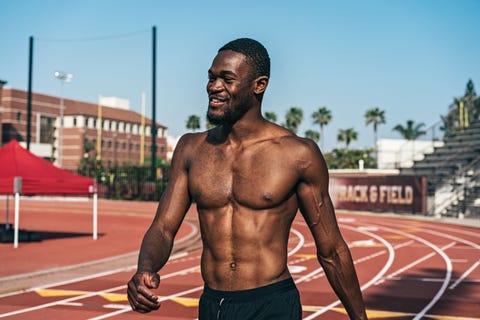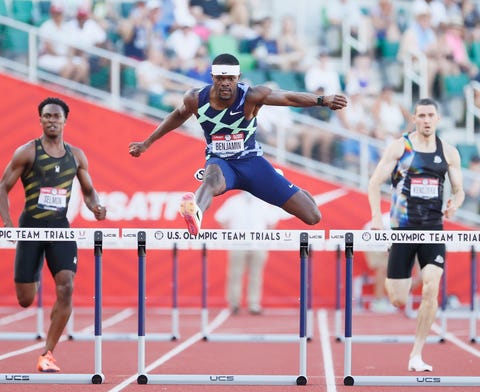Olympic 400-Meter Hurdler Rai Benjamin’s Tips for Running Faster
WHEN HE TAKES the Olympic track for the 400-meter hurdles, Rai Benjamin knows he’ll be battling through one of track and field’s most rigorous events. His trademark race warrants cardiovascular and muscular systems efficient enough to sustain a sprinter’s speed for a full lap. But it also demands phenomenal mechanics and the agility and flexibility to clear ten three-foot hurdles evenly spaced around the track while not losing velocity.
Yet during the pandemic, he had just one way to train: He could run. Benjamin, who’s the third-fastest 400-meter hurdler in history (46.98 seconds is his career best), sometimes practiced at the University of Southern California track in Los Angeles, but by May 2020, coronavirus lockdowns had blocked access there. So he changed tactics. Along with his training partners, 400-meter stud Michael Norman and women’s track veteran Kendall Ellis, he hit the pavement. “We started practicing in the streets,” says Benjamin, who turns 24 in July.

It was a reminder that you don’t need a 400-meter loop and a host of strength-training tools to build speed and athleticism. All you need to do is run. For Benjamin & Co., that involved dawn 200- and 300-meter sprints on concrete in downtown alleyways. Other days they’d run for miles on the beach, using the sand’s instability to strengthen their ankles and challenge stabilizing muscles—and getting a reminder to appreciate nature. “After you finish, you just sit on the sand and you hear the waves crashing,” Benjamin says. “You’re looking into the water, and it’s really serene, really peaceful. It kept things interesting.”
Interesting and demanding. After beach runs, Benjamin would spend an hour sprinting up a grassy hill and walking back down, perfecting his sprint form. “It was actually crazy what we were doing,” he says. “But it was fun at the same time because we were in these West L. A. neighborhoods working out. People would come out and watch us.”

To blast their quads, the crew dusted off their bikes and rode up a hill as fast as they could. “You know that will never be something you ever do as a track-and-field runner,” Benjamin says. “But it was really fun. Every week it was something new.” And even though he jumped nary a hurdle for months, it all worked. At May’s USATF Golden Games, his first big race in more than 19 months, he clocked a 47.13, the 14th-fastest 400 hurdles in history.
Benjamin says he was a bit “sloppy” with his technique at that event and is working furiously to clean it up. Blame that on his extended time away from the hurdles—and expect a better performance in Tokyo. “I know my potential,” he says, “and I know if I run the perfect race to the best of my ability, I feel like it’s going to be insane.”
Benjamin’s tips to add thickness to your quads and sprint faster:
Crush the First 10
One of Benjamin’s favorite drills is the 10-meter blowout. “Just sprint as fast as you can for 10 meters,” he says. “But do it while being mechanically sound.” Keep your chest slightly forward and your core tight, and focus on aggressively driving your knees high with each stride. Do 5 sets, resting 90 seconds between each.
Learn to love bounding

To forge explosive strength, hone balance, and build the stabilizer muscles around his knees, ankles, and hips, Benjamin does bounding drills. “Start with both feet on the ground, then jump forward and then hop on one leg. Then explode off that one leg onto the other leg, then explode again off that leg and land.” You’re taking exaggerated sprint strides and forcing yourself to control each landing and takeoff on one foot. The 3 bounds equal 1 set; do 5 sets, with 90 seconds between each.
Breathe Easy to go faster
Yes, sprinting is intense and explosive, but if you want to get faster, you must be “in a relaxed state before you compete,” Benjamin says. That’s why he practices the 4-7-8 breathing method recommended by Andrew Weil, M.D. First he blows out all the air in his lungs, then he inhales through his nose for 4 seconds. He holds his breath for 7 seconds, then, through pursed lips, blows out that breath for 8 seconds.
Watch the Tokyo Olympics beginning July 23 and the Tokyo Paralympics , beginning August 24, on NBC. To learn the latest, visit TeamUSA.org
This story originally appeared in the July/August 2021 issue of Men’s Health.
Source: Read Full Article
